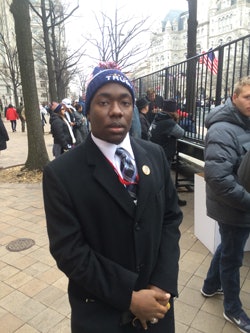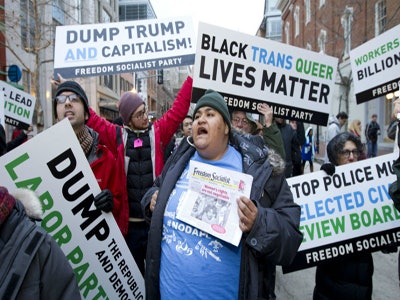WASHINGTON — Wearing a long black overcoat and a blue knit camp emblazoned with the name “TRUMP” in all white letters, it wasn’t hard to figure out where Diante S. Johnson stood politically among the thousands who gathered along Pennsylvania Avenue Friday for the inaugural parade.
 Diante S. Johnson, a student at the University of Illinois, says President Trump is “gonna do a great job.”
Diante S. Johnson, a student at the University of Illinois, says President Trump is “gonna do a great job.”“He cares deeply for this country and he’s gonna do a great job,” Johnson, 20, a University of Illinois at Champaign student and founder of the Black Conservative Foundation, said in reference to President Donald J. Trump — whom he said he met several times while working on his campaign — as protesters and supporters argued nearby over the legitimacy of Trump’s ascendancy to the White House.
Just a few feet away, Moneka Jani, a recent biodefense graduate from George Mason University, carried a sign that made her stance toward Trump equally as clear.
“I will never support a president who is an overt racist, who has admitted to sexual assault, who has committed financial fraud,” the sign stated in black with a hashtag written in pink that included an expletive that indicated her rejection of President Trump.
“I came to voice my disapproval,” Jani said. “He has no respect for minorities and women. He is here to serve Americans who are White men.”
Jani spoke of her family — Muslim immigrants from India and Pakistan — being targeted by racist remarks and taunts to “go back to your country” like those she said her family experienced in the wake of 9/11.
Despite an inaugural speech in which Trump invoked a Bible verse about unity and stated “there is no room for prejudice” in patriotism, the angry exchanges that could be seen along Pennsylvania Avenue Friday demonstrated that the strife brought about by the 2016 election is unlikely to go away anytime soon.
For every person sporting a red cap with the Trump slogan “Make American Great Again,” there were protesters carryings signs that stated things such as “American Deserves Better.”
Some political science scholars gave Trump poor to slightly above average marks for his speech.
Dr. Sharon Wright Austin, associate professor of political science at the University of Florida who has taught courses titled “Cultural Diversity” and “Presidential Inauguration Seminar,” said Trump’s speech appealed mostly to his base at the expense of giving scant attention to diversity.
“That’s what his constituents wanted to hear,” Austin said in reference to Trump’s opening remarks about his plans to “rebuild” America and “restore” its promise, which Austin said was a slight against President Barack Obama.
“With that part it was pretty obvious that it was directed at the Obama administration,” Austin said.
Austin said if she were to give Trump’s inaugural speech a grade, she would give it a C+.

“The tone of President Trump’s inaugural address was a significant departure from President Obama’s first inaugural in 2009,” said Williams, a doctoral candidate in the department of government and international affairs at the University of South Florida, making it clear that she was speaking independently and not on behalf of USF.
“Obama’s speech spoke of optimism, national unity, and the possibility of change,” Williams said. “Today’s address had strong anti-government messages that contained racial overtones that in many ways resembled his campaign speeches.
“While he had included statement that asked for racial healing, Trump had three references to racially stigmatizing language that alluded to his view of the moral depravity of poverty-stricken Black communities,” Williams said, referring to phrases such as “gangs,” “inner city,” and “single mothers,” terms she said that are “code” words in political science for race.
“His remarks provided assurance and comfort to those Americans who believe that the forgotten man is the White middle and working class man who believes that their plight is due to government neglect and minorities,” Williams said.
Anti-Trump sentiments permeated throughout American campuses nationwide as students staged demonstrations to counter the inaugural ceremonies in the nation’s capital.
Also, just as some Congresspeople, such as U.S. Rep. John Lewis (D-Ga.) and government officials purposefully skipped the inauguration, some scholars refused to even watch the inauguration on TV.
“For me it was as much priority as protest,” said Dr. Imani Perry, the Hughes Rogers Professor of African American Studies at Princeton University.
“Given what is coming I hardly think it makes sense to passively consume the inauguration of a bigoted, misogynistic and grossly uninformed person to one of the most powerful positions in the world,” Perry said. “The time I spend engaging with (Trump) in the coming years will be time devoted to working against the enormous damage he inevitably will bring to an already suffering world.”
Johnson, the University of Illinois student who backed Trump, said such criticism is wrongheaded.
Johnson said he was unmoved by arguments that Trump’s cabinet lacks diversity.
“Diversity is important but we want to make sure if you put someone in the cabinet, you want to make sure they’re qualified,” Johnson said. “You can’t just sit anyone on the team because they’re active in the political world and diverse.”
Johnson noted that there individuals from non-White backgrounds that are “not in the cabinet but are helping” and who will be an “asset to the team.”
He mentioned HUD secretary Ben Carson and White House and Omarosa, who was appointed as assistant to the President and director of communications for the Office of Public Liaison, as examples. Johnson said Carson is particularly suited to run HUD because he grew up in housing “similar” to that of public housing.
Others, however, were unmoved by Trump’s overtures at diversity in his inaugural speech.
“I think it’s overly simplistic to say there’s no hope and everything is lip service,” said Nate Coderre, a recent Cornell University graduate — sporting a eggshell white hoodie that paid homage to his alma mater — as he stood along the inaugural parade route.
“But he absolutely does not have any stake in any inclusive America,” Coderre said. “He’s trying to court the favor of people who are fundamentally against that.”
Williams — the doctoral student at USF — voiced similar concerns.
“There were lots of platitudes and symbolic patriotism,” Williams said. “But there was no substance. There was not a sense that hard work, collective sacrifice, and new thinking would be needed.
“The speech suggested that if we return to the perceived traditional American values of the past, we could return to the time when the American middle class dominated the economy and our social and political values,” Williams said. “I am of the view that if we compare Trump’s dialogue, understanding of the office that he holds, and stature to past presidents, (he) will never be considered presidential.
“His speech demonstrated that he does not have the capability to be perceived by the majority of Americans as presidential.”
Jamaal Abdul-Alim can be reached at [email protected] or you can follow him on Twitter @dcwriter360.


















